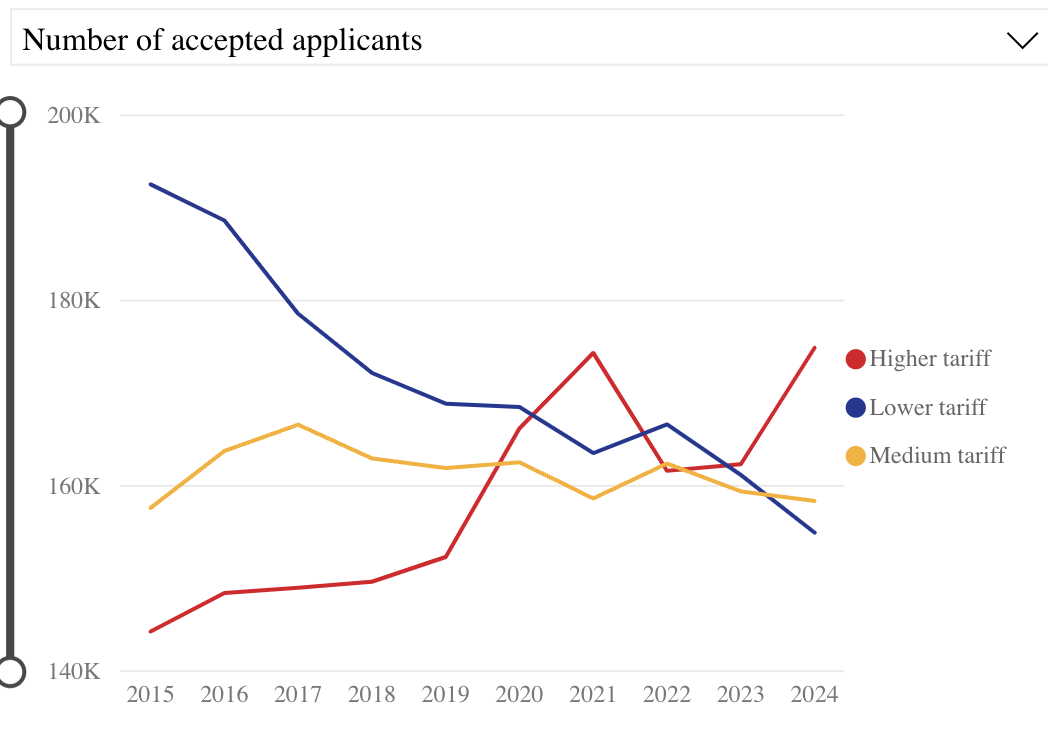Universities will be told to “double down” on sharing things
Jim is an Associate Editor (SUs) at Wonkhe
Tags
Yesterday the BBC got a slice demanding higher tuition fees and direct government funding.
Last night in the Guardian we got:
English universities offer to curb foreign students if they can raise tuition fees.
It says that UUK is offering to “curb the rise in overseas students” in return for “greater stability and the chance to increase tuition fees”.
It adds that the blueprint will include proposals on institutions “voluntarily managing international student population” growth, particularly for “areas facing accommodation shortages or pressure on local services”.
Ministers might ask why such restraint was not shown in the past. It’s also not immediately clear that a message of “give us more money or we’ll flood the place with international students” is quite the welcome for new students the sector intends. Nor – looking at this year’s numbers – is it a threat that looks like the sector could deliver on.
And anyway – is the blueprint also going to offer to “voluntarily manage” domestic student population growth, particularly for “areas facing accommodation shortages or pressure on local services”, in the cities that have high-tariff universities in them?

Maybe it’s all been taken out of context and so on and so on.
Now this morning, the Telegraph gets its bit with another call to index-link fees, increase maintenance loans and reintroduce grants – only this time the deal in return concerns our old friend “efficiencies”.
It reports that UUK will list the efficiencies that universities are prepared to make to save money within the sector – including “plans for universities to share campuses and other resources.”
Apparently, universities are to “double down” on a report led by Sir Ian Diamond on how to repair the sector following the 2008 financial crash. UUK Vivienne Stern is quoted as saying:
This is a sector that has opened the bonnet and looked hard at what it can do itself. It’s a sector that knows it also has to change. It’s not just about holding out a begging bowl to Government and saying ‘give us more cash’.
The example given in the piece on campus sharing is Falmouth, whose Tremough campus is home to both Falmouth University and a bit of Exeter University.
The development was a part of the Combined Universities in Cornwall (CUC) initiative and was funded largely through European Union Objective One funding, matched by UK Government funding provided through the South West Regional Development Agency. That doesn’t feel like the sort of money available now, but who knows.
The obvious wider question that comes up when someone mentions efficiencies is “if there really are some, does that mean you’ve been squandering money all these years” but the suggestion is that there’s some unlocking that could be done via this “doubling down”.
The Ian Diamond review mentioned in the piece was this report by what was called the Universities UK Efficiency and Modernisation Task Group back when someone called Nicola Dandridge was in charge.
It had 17 recommendations.
1 and 2 were on transparency, benchmarking and the use of data, 3, 4 and 5 were on process improvement, simplification and standardisation, and 6 proposed things like a best practice hub. Process.
The meat was in the rest. 7, 8 and 9 proposed work on shared services – the identification of “noncompetitive” areas where more extensive sharing of operational services could be developed and promoted, partnership outside of the sector (ie with public sector bodies), and old chestnut of getting a VAT exemption on cost sharing past HMRC.
10 was on new ICT systems and facilities (with a view to reducing energy costs and lowering carbon emissions), 11 was on outsourcing stuff like ICT provision, student accommodation, facilities management, security and student support (!), 12 and 13 were on better procurement, and 14 and 15 were on lowering the burden of regulation – by doing things like exempting universities from the FOI act.
The report doesn’t really go into how much all of that would have saved, not why the savings were needed (based on an explanation of where the money went/goes), but maybe the 2024 blueprint will answer those questions.
One other interesting bit is that universities will “be told to mimic the University of London” and look at “sharing the provision of individual courses to save costs” – apparently to avoid wholesale mergers between universities, which are “costly and legally complex”. That’s a shame. I was rather looking forward to digging out my notes on the UWE/Bath merger from 1997. The meetings I was in when I was an SU officer were quite a ride.


An easy way to merge should be to have shared Students Unions where there are multiple in fairly close geographies. Have some officers dedicated to specific institutions (as with the current fad towards faculty officers), advice teams focussed on specific institutions but share the infrastructure, societies, wider services etc. Huge efficiencies in some places. Obviously only really works in the cities but it’s a start…
Allowing and introducing casual lecturers to teach across multiple institutions, with fair compensation based on their teaching workload. This will provide great savings and flexibility for the institutions.
That sound like real race to the bottom stuff
With Leeds having 8 HE providers with students unions. I find it slightly bonkers we’re not already doing this.